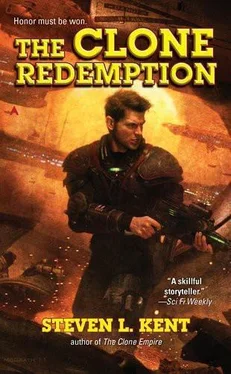Steven Kent - The Clone Redemption
Здесь есть возможность читать онлайн «Steven Kent - The Clone Redemption» весь текст электронной книги совершенно бесплатно (целиком полную версию без сокращений). В некоторых случаях можно слушать аудио, скачать через торрент в формате fb2 и присутствует краткое содержание. Жанр: Боевая фантастика, на английском языке. Описание произведения, (предисловие) а так же отзывы посетителей доступны на портале библиотеки ЛибКат.
- Название:The Clone Redemption
- Автор:
- Жанр:
- Год:неизвестен
- ISBN:нет данных
- Рейтинг книги:4 / 5. Голосов: 1
-
Избранное:Добавить в избранное
- Отзывы:
-
Ваша оценка:
- 80
- 1
- 2
- 3
- 4
- 5
The Clone Redemption: краткое содержание, описание и аннотация
Предлагаем к чтению аннотацию, описание, краткое содержание или предисловие (зависит от того, что написал сам автор книги «The Clone Redemption»). Если вы не нашли необходимую информацию о книге — напишите в комментариях, мы постараемся отыскать её.
The Clone Redemption — читать онлайн бесплатно полную книгу (весь текст) целиком
Ниже представлен текст книги, разбитый по страницам. Система сохранения места последней прочитанной страницы, позволяет с удобством читать онлайн бесплатно книгу «The Clone Redemption», без необходимости каждый раз заново искать на чём Вы остановились. Поставьте закладку, и сможете в любой момент перейти на страницу, на которой закончили чтение.
Интервал:
Закладка:
I rose to a crouch and dropped, not hoping to shoot so much as to keep the bastard honest. I wanted to keep him on his toes. I wanted him to know I was watching, waiting, biding my time until he dropped his shields; and then I would have my shot.
I wanted him to think that I was blind, but I was not blind, not anymore. He was using heat vision to track me. Using the tactical view, I could see the glow his shields projected on the wall.
Another moment passed, and he began shooting faster, maybe five shots per second. The shots cut a line above me, some pinged off the side of the catwalk.
And then he made his move. He lowered his shields, and the cabin went dark. The moment the cabin went dark, I rolled to my side and fired three shots blindly as I engaged my night-for-day lenses. Even before the lenses showed me the cabin floor, I instinctively knew I had hit the target.
The bastard lay on the cold steel deck, rolling and writhing like a fish on a line. Blood leaked out of his armor at the shoulder and gut. The two shots that hit him in the shoulder probably hurt more than the one in the gut, but it was the latter that would kill him.
I’d seen too many men kill the enemy who had dealt them the fatal blow, so I waited on the catwalk and watched as the poor bastard bled to death. I watched as his convulsions slowed into tremors, and his tremors slowly went still.
“Does the computer work?” I asked.
“I haven’t tested it yet,” he said.
That made sense. You’d want to make sure you had everything ready before you booted a computer that conjured up ghosts.
CHAPTER FOUR
The Enlisted Man’s Empire had men and ships and a recently rebuilt broadcast network. What we did not have were the “ghosts.” We needed the computer from the spy ship to reach the Unified Authority’s top secret ghosts.
Okay, well, I called them ghosts. In truth, they were virtual reproductions of William Sweetwater and Arthur Breeze, the two dead scientists who had helped thwart the Avatari’s first invasion.
Shortly before they died, the real Sweetwater and Breeze allowed a team of medical technicians to scan their brains and take samples of their DNA. Somewhere along the line, the Unifieds used the scans and samples to re-create the scientists inside a computer. They used the DNA to construct virtual models of their bodies that were realistic enough to make their scanned brain waves feel right at home.
In order to keep the virtual versions of Sweetwater and Breeze from figuring out that they weren’t real, the models had all of the original scientists’ mental and physical flaws. In life, William Sweetwater had been an overweight, middleaged dwarf who got winded climbing a single set of stairs. When virtual Sweetwater climbed a flight of stairs, his pulse rose dangerously high, and sweat stains formed under his arms. I’d placed a few calls to virtual Sweetwater. When he had to run to the monitor to catch the call, he came panting.
In his computer universe, virtual Arthur Breeze was a six-foot-six balding beanpole with dandruff and oily skin who needed to clean the grease from his glasses every couple of minutes. He stuttered when he became nervous, which was most of the time since he suffered from an intense inferiority complex.
The flaws were almost as entertaining as the men themselves.
But the tiny computer Freeman showed me had neither a broadcast engine for pangalactic communications nor the power to host the complex models of Sweetwater and Breeze.
“That’s it?” I asked. “I played hide-and-seek with a guy in shielded armor for that?”
The computer was the size of a man’s wallet, and most of it was screen. “Where’s the broadcast engine?”
“Broken,” said Freeman.
“Broken? So we’re out of business,” I said.
“The computer works, I just need to connect it to a broadcast engine before we can reach Sweetwater and Breeze,” Freeman said.
“Did you have one in mind?” I asked. Broadcast engines were complex and dangerous machinery. You didn’t find them lying around.
“The E.M.E. broadcast network,” said Freeman. He was so big and so menacing, I sometimes wondered if he realized just how frightening he could be.
The Enlisted Man’s Empire had a broadcast network. It was the backbone of the empire. Friend or foe, it didn’t matter, I was not about to give a mercenary access to the network.
“You’re out of luck, Ray,” I said. “I won’t give you that access.”
He sat on the edge of my desk, staring down at me. His wide-set eyes reminded me of the barrels of a shotgun. Even though he spoke softly, his voice had a thunderlike rumble. The voice and the eyes were intimidating, but not as intimidating as the implicit threat of his enormous arms and chest.
Freeman sat silent for a moment, then he said, “You’re going to need Sweetwater and Breeze if you’re planning to evacuate planets.”
“I’m not giving you our broadcast codes,” I said.
Freeman’s expression did not change. He did not smile or snarl or do anything threatening. He simply spoke in a quiet voice as he asked, “Are you saying that the Enlisted Man’s Empire is going to abandon its planets and citizens?”
Oh, shit, I thought. With that simple question, he had served notice. If the Enlisted Man’s Empire was no more committed to saving lives than the Unified Authority, his loyalties might shift.
I could have shot him, of course. We were on the Churchill , an E.M.N. fighter carrier. I had thousands of sailors and Marines at my disposal. Even the mighty Ray Freeman would not escape if I sounded the alarm …maybe. I did not want him as an enemy, and he made a powerful ally.
I weighed all of the possibilities in my mind, then I smiled, and said, “We won’t have much of an empire if we let everybody die.”
The compromise was obvious. Freeman probably expected it from the start. He said, “The computer stays with me. When we need to contact Sweetwater, I control the computer, and you control the broadcast access.”
I was the commanding officer of the largest navy in the galaxy, and he was nothing more than a mercenary, but he had just proposed an equal partnership. I thought about it for a second, and said, “I can live with that.”
Freeman and I sat side by side in a conference room on the Churchill . Freeman’s little communications computer, now jacked into the ship’s communications network, sat on the table between us.
Freeman toyed with the links going to his computer, and asked, “What time is it?”
I looked over at the wall and saw what Freeman already knew. “01:00 STC,” I said. STC was short for “Space Travel Clock,” the twenty-four-hour clock used for synchronized space travel.
“They’re asleep,” he said.
As nothing more than sophisticated computer animations, Sweetwater and Breeze should have been able to work around the clock; but they had been programmed to eat, sleep, and shit. They didn’t know they were dead. No longer needing sleep might tip them off to their virtual state; and if they learned they were virtual, no one could predict how they might react. They might go into a depression or refuse to work.
If some virtual lab assistant answered our call, he’d undoubtedly warn the Unifieds that we had broken into their system. “Maybe we should wait until 10:00,” I said. “We wouldn’t want to disturb them.”
Freeman, being Freeman, did not note the irony in the situation, and said, “They’ll be in the lab by 07:00.”
I nodded. “Not much we can do until then,” I said, meaning there was not much for Freeman to do. I, on the other hand, had a hundred hours’ worth of work to fit into the next six hours.
Читать дальшеИнтервал:
Закладка:
Похожие книги на «The Clone Redemption»
Представляем Вашему вниманию похожие книги на «The Clone Redemption» списком для выбора. Мы отобрали схожую по названию и смыслу литературу в надежде предоставить читателям больше вариантов отыскать новые, интересные, ещё непрочитанные произведения.
Обсуждение, отзывы о книге «The Clone Redemption» и просто собственные мнения читателей. Оставьте ваши комментарии, напишите, что Вы думаете о произведении, его смысле или главных героях. Укажите что конкретно понравилось, а что нет, и почему Вы так считаете.












